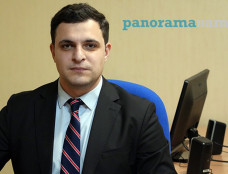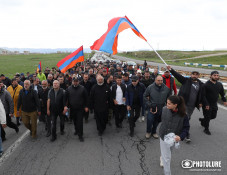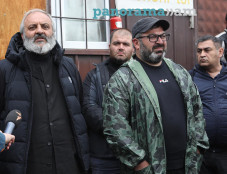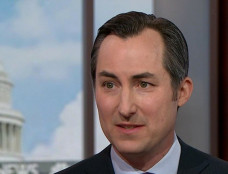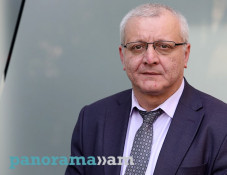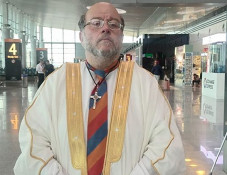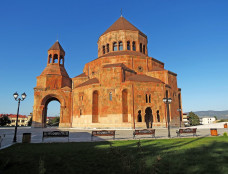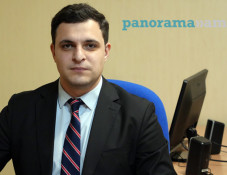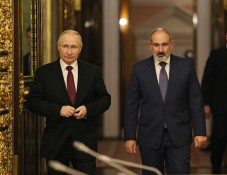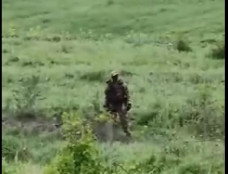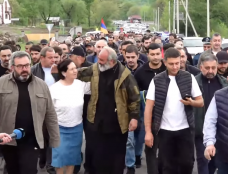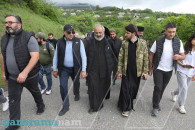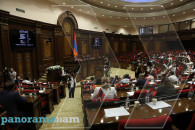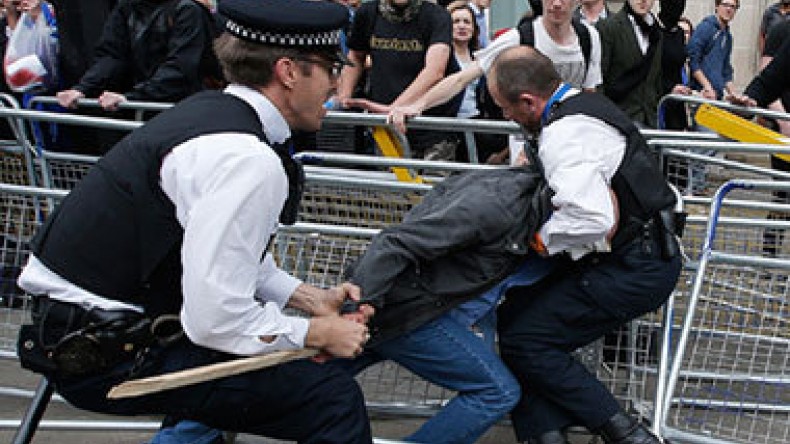
Police brutality UK-style: The tragic case of Kingsley Burrell
By Dan Glazebrook, RT
In March 2011, Kingsley Burrell called the police requesting help, fearing he and his son were at risk from an armed gang. By the end of the day, Burrell had been arrested, beaten and had his son taken from him. Four days later he was dead.
Since then, it has been a long, hard struggle by Kingsley’s family and friends to find out the truth about what happened - but last month, during an excruciating five-week inquest, that truth finally came out.
When they arrived on the scene and found no evidence of anyone threatening Kingsley, the police decided to arrest him under Section 136 of the Mental Health Act, claiming he was delusional. Both he and his son were taken away in an ambulance, where the police set upon Kingsley in an attempt to forcibly remove him from his son. During the inquest, it emerged that Kingsley had not been asked to relinquish his son before police attacked him. One officer admitted in typically guarded language: "I accept that to communicate to everybody, in an ideal situation, that would have been done."
Kingsley was then driven to the Oleaster mental health unit of the local hospital and later transferred to another mental health facility, the Mary Seacole Unit. What exactly happened to him during this time is unclear, but his sister Kadisha visited him in the unit the following day, telling the inquest "Kingsley had three lumps, one on his forehead. I said to [his partner] Chantelle 'take a photo of that'.”
“Kingsley said to me, ‘I can’t move’. He couldn’t move the upper part of his body… He couldn't move his head, couldn't move his body, couldn't move his shoulders,” she said, adding he had deep marks around his wrists. She later discovered that her brother had been left handcuffed to the hospital floor for five or six hours, had not been allowed a drink of water or a visit to the toilet and was subsequently left to urinate on himself. He told her that after he requested the handcuffs be loosened the guards tightened them even more.
On March 30th, police were called back to the Mary Seacole Unit after staff there reported he was acting aggressively; when pressed for more detail in the inquest it transpired that he had been making ‘stabbing motions’ with his toothbrush.
This was apparently all the excuse the police needed to launch another blistering attack on the man they had left barely able to walk just three days previously. Kingsley over the course of the next two and half hours was again beaten, this time whilst sedated, handcuffed and in leg restraints. During this time, he was transferred by police to the Queen Elizabeth hospital, first to emergency to stitch up a head injury he had sustained during the course of the restraint, and then back to the Oleaster Unit of the hospital. During the ambulance journey, a towel was wrapped around Kingsley’s head; when asked why, it was explained that it was because he had been spitting. The restraints were finally removed on arrival at the Oleaster seclusion unit. A staff member present told the inquest that whilst removing the restraints, one officer “knelt on Kingsley’s back between his shoulder blades” whilst others punched his thighs “with a lot of force,” including with the butt of a police baton. He noted: “These were methods that I had never seen before—they were alarming and shocking.” He explained how the police then left Kingsley face down on the bed with the blanket still wrapped around his head. He was motionless.
During this time, Kingsley’s respiratory rate had been dropping; since he was coming out of sedation it should have been rising. The inquest revealed that this drop had been noted but not acted upon on several occasions. Even when it dropped to below half the usual rate, there was apparently “no urgency” about the situation.
Eventually, Kingsley went into cardiac arrest. Community activist Desmond Jaddoo’s blog of the inquest hearings records what happened next: “This afternoon we heard from the Doctor who was on call when Kingsley went into cardiac arrest and it was a complete case of confusion, as she claims that she was told to go to the wrong ward and when she arrived there, there were no compressions being done and they placed him on the floor for a solid surface for compressions. Furthermore, we went on to hear the wrong breathing mask was used initially, along with the defibrillator not having any pads and there was a delay whilst an alternative one was obtained from a different ward.”
Kingsley Burrell was pronounced dead the next day. Last month, the five-week inquest concluded that the police had used excessive force and contributed to his death, as did the covering left over his head, and the neglect he so clearly suffered. It was a damning indictment not only of the police, but also of the various mental health workers and ambulance staff who allowed the brutal treatment to continue, and of the Crown Prosecution Service who refused to prosecute anyone over the death. Had the coroner allowed ‘unlawful killing’ to be considered, it is quite possible the jury would have reached this verdict.
Following the verdict, the all-too-familiar refrain of “lessons learnt” began to emanate from all corners of officialdom. Coroner Louise Hunt pronounced: “The only consolation to family members is lessons can be learnt from such a tragedy.” West Midlands Police Assistant Chief Constable Garry Forsyth said, “Crucial lessons have been learned from this tragic case and how the force manages people who are detained with mental and physical health needs.” Police and Crime Commissioner David Jamieson told the press: “Clearly more lessons need to be learned by all the agencies involved so that these tragic incidents are not repeated.”
This is the same refrain that is churned out every time somebody dies while in police custody. Time and again, families are forced to battle for the truth, often for years, against all the odds - but when that truth is revealed, and the states’ culpability in the death of their loved ones is revealed, the state refuses to administer justice. Instead, it calls for ‘lessons to be learned,’ as if police officers beating a man to death is akin to a schoolboy failing a math test. As the chair of the Kingsley Burrell justice campaign Maxie Hayles commented, “We are constantly told that 'lessons are being learned.' The black community is totally fed up with hearing this rubbish. It’s almost like we are an experimental project.”
The truth of the matter is that, precisely because justice is never done, these ‘lessons’ are never actually learned. The Institute of Race Relations published a report into deaths in custody in March of this year, examining over 500 black and minority ethnic deaths in custody that have occurred in the UK since 1990. Their report noted that “despite narrative verdicts warning of dangerous procedures and the proliferation of guidelines, lessons are not being learnt: people die in similar ways year on year.”
Indeed, every aspect of the Kingsley Burrell case is depressingly familiar to campaigners on police brutality. Every single element of ‘what went wrong’ had already contributed to previous deaths on several occasions, and everyone has already, we have been told, resulted in ‘lessons being learnt,’ long before Kingsley’s fateful call to the police in 2011.
One such lesson is the lesson of ‘institutional racism’. This was the term used in the 1999 MacPherson report into the death of teenager Stephen Lawrence, which concluded that the police mishandling of that case was a result of the institutional racism of the Metropolitan Police. This racism results in the black community being “under-policed as victims and over-policed as suspects” in the memorable words of campaigner Stafford Scott, with racial stereotyping leading both to the excessive use of force against black people and an assumption that they are deviant.
Despite the ‘lessons learnt’ from the Lawrence case, both factors clearly played a role in Kingsley’s death. PC Shorthouse, a six-foot-four tall police officer involved in Kingsley’s death, told the inquest that his “knees were knocking together” in fear of dealing with Kingsley, prompting the family’s lawyer to ask him: “Are you sure you were not applying the stereotype of Kingsley being mad, black and dangerous?” “No, not at all,” Shorthouse replied. “He was the strongest, most aggressive person I have ever met in my career as a police officer.” Perhaps. But one wonders how much aggression Kingsley was meting out whilst sedated with his arms and legs strapped down, or whilst being beaten face down and motionless on a hospital bed.
Another explanation for the incident was put forth by the Institute of Race Relations in their examination of similar cases: “Black men, especially young black men, acting erratically or even asking for help, are stereotyped first and foremost as bad, mad, and, being black, likely to be involved in drugs and/or violent – so they are met with violence.”
Even when victims display clear warning signs of being in serious danger, police often ignore them on the grounds they believe their victims are “faking it.” As Shorthouse told the inquest, he assumed that Kingsley pleading with him that he couldn’t breathe was “tactical.” Such assumptions were also fatal in the cases of Sean Rigg, Christopher Alder and Habib Ullah, as well as many others.
Yet this ‘lesson’ - that institutional racism and racial stereotyping is dangerous and can even be fatal - is one that had supposedly already been learnt from the MacPherson report in 1999. Just for good measure, it was ‘learnt’ again in 2006 when an IPCC (Independent Police Complaints Commission) report concluded that “unwitting racism” contributed to the death of Christopher Alder – a very generous finding given CCTV footage appeared to show the officers standing around making monkey noises whilst he lay dying – and that four of the officers present when Alder died were guilty of the "most serious neglect of duty."
Another lesson not being learnt is that, when it comes to holding the state to account, the Crown Prosecution Service (CPS) is not fit for purpose. In 1999, the Butler Report – an official government inquiry into deaths in custody – was seriously critical of the CPS’s obvious unwillingness to prosecute police officers. Yet given the behavior of the CPS in subsequent years, the report may as well have never been written. Even when verdicts of unlawful killing are reached, as the IRR has noted, “there has still been a marked reluctance to prosecute those implicated.” The number of prosecutions resulting from the 509 suspicious custody deaths detailed in their report can literally be counted on one hand – and even where prosecutions are brought, they are not done so effectively.
Following years of campaigning by Alder’s sister, Janet, the CPS did eventually bring a prosecution of the officers involved in Christopher Alder’s death.
However, the CPS then conflicted much of the evidence, meaning the judge had to throw it out, with the most damning evidence - the CCTV footage - never presented to the jury. Janet then brought a civil case against the CPS, in which the judge concluded that she shared Janet’s concerns “as to the standard of the investigation undertaken by West Yorkshire Police into the actions of the Humberside officers.” No surprise then, that the CPS decided last August not to prosecute the police officers implicated in Kingsley Burrell’s death, leading to a protest by the Burrell family and their supporters outside its Birmingham headquarters. Lessons learnt?
The list of lessons that should already have been learnt is endless. Another lesson concerns “positional asphyxia” – suffocation due to a person’s body position blocking their airways. The IRR report shows there have been at least nine cases of deaths in police custody where ‘positional asphyxia’ was identified as a cause of death since 1990. ACPO guidance, says the IRR, already “makes clear that placing suspects in a prone position….gives rise to the risk of death by positional asphyxia and the prone position must be avoided if possible, and minimized if unavoidable. It also recommends that body weight should not be used on the upper body (ie sitting on a suspect) to hold down a person.” This lesson was supposedly ‘learnt’ in the 1990s. Yet it did not stop the officers involved in Burrell’s case from ignoring the advice, putting him in prone position and leaning on his chest, causing the positional asphyxia which led to his cardiac arrest – just as predicted by ACPO’s guidelines. If the British state really is being ‘taught lessons,’ it must be a seriously retarded pupil.
Another lesson that should by now be well understood is that “excited delirium” is a medically dubious diagnosis routinely wheeled out by dodgy police pathologists desperate to avoid verdicts of positional asphyxia at inquests. Refuted by the vast majority of medical experts, this did not stop police pathologists bringing it up both at Kingsley’s inquest, and at the inquest of Habib Ullah earlier this year.
At least the pathologists are giving distorted interpretations of the facts, however, rather than simply making them up. Another lesson is that it is not only racism that is apparently institutional in the police force – so too are cover-ups and lying. Last week, hearings for gross misconduct began against police officers involved in the death of Habib Ullah, all five of whom heavily doctored their witness statements to the IPCC about what happened, removing references to the use of force used, to other witnesses on the scene, to warning signs of his deteriorating condition and much else besides.
As Gerry Boyle, presenting the case against the officers, said: “The nature and extent of the deletions and amendments these five officers made were on a breathtaking scale, covering almost every single aspect of the incident.” (Needless to say, the CPS dismissed the IPCC’s suggestion that those involved be charged with perjury and various other charges). At Kingsley’s inquest, a similar pattern emerged. The testimony of PC Adey and ambulance driver Mr MacDonald-Booth were particularly shameless. Various witnesses had testified that, after his restraints were taken off, Kingsley’s arms dropped to his sides and he never moved again. "I know what I saw” PC Adey said, “he raised his head.” Incredulous, the coroner replied: "I suggest you are wrong, officer."
In an earlier statement, Adey said he had seen this through a window in the door. But it emerged in the inquest that this window was covered by a locked hatch to which only nurses had the key. Adey also insisted that Kingsley’s face was uncovered, contradicting evidence from six other witnesses that his face was covered with a towel or sheet. “How can they all be wrong, officer?” asked the coroner, showing him CCTV photographs of Kingsley’s head covered. He said he wasn’t looking at him at the time. Adey also denied kneeling on Kingsley’s back, as had been described by two other witnesses.
The coroner, Louise Hunt, also became exasperated with Mr Macdonald-Booth, the ambulance driver, whose testimony in the inquest directly contradicted his own earlier statements. Mr MacDonald-Booth, it turns out, had only recently joined the ambulance service, having previously been – any guesses? - a police officer.
We were told ‘lessons had been learnt’ from the Hillsborough disaster, where police had systematically lied about the 96 football fans killed as a result of poor policing in 1989; we were told the same about the miners’ strike – where police had systematically lied about those they arrested at Orgreave; and again after “Plebgate”, when police officers had lied about what they heard Andrew Mitchell say in Downing St. Lessons learnt? Kingsley’s inquest suggests otherwise.
Yet lessons are being learnt. The real lesson – being taught again and again - is that impunity prevails; that, if you are an agent of the British state, you can falsify your evidence, you can lie in court, you can attack people from vulnerable or minority groups at will, and whatever happens – even if you kill them – that state will protect you. We don’t need any more lessons to be learnt; indeed we have had enough of this lesson being learnt. What we need is for justice to be done.
Newsfeed
Videos





